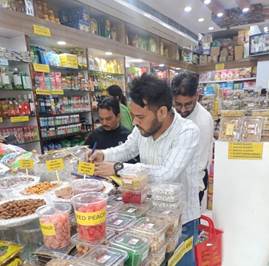Chandigarh adds touch of swachhata to Diwali Celebrations
Initiates ‘Swachh Bazaar Pratiyogita’ to encourage swachhata at marketplaces

Cities are immersed in joyous celebrations as the festive season is in full swing, with a focus on cleanliness and hygiene. Markets are bustling with massive crowd. As the Ministry of Housing and Urban Affairs rolled out the ‘Swachh Diwali, Shubh Diwali’ campaign, it nudged cities & encouraged them to celebrate clean and eco-friendly festivals. Chandigarh has come up with a unique initiative of its own which not only encourages swachhata at marketplaces but also fosters a sense of healthy competition towards keeping one’s surroundings clean. The MCC has initiated the ‘Swachh Bazaar Pratiyogita’ (Clean Market Competition) to evaluate the level of cleanliness based on various parameters. Over the course of the competition, markets will be assessed based on general cleanliness, sanitation of public toilets, availability and maintenance of twin bins, measures taken against single-use plastic by market associations, spreading awareness on ‘Say No To Plastic’, waste segregation, beautification of market areas, shops using eco-friendly alternatives among others. This initiative is not only encouraging citizens to engage in cleanliness but also helping to promote waste to wealth and encourage locally made products.

Adopting the concept of 3Rs, Chandigarh promoted the idea of sustainable gifting during clean, green festivities. Made by women artisans from Self Help Groups, a bunch of beautifully handcrafted potlis have been made from fabrics donated at the RRR centre by citizens. These potlis would be available at the civic body’s eco-friendly store ‘Prarambh’. It is being seen as an attempt to not just reduce waste but also provide sustainable income to women.














